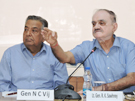In continuation of a long series of seminars and discussions on the future of Afghanistan, held by the VIF from time to time since 2009, a fresh round of discussion on the ‘Developments in Afghanistan: Implications and Options for India’, was held on 11 July 2016.
The discussion was held broadly against the backdrop of Afghanistan’s worsening situation leading to a realization within India’s strategic community for a thorough review of India’s Afghanistan policy. While the situation in Afghanistan has been going from bad to worse for quite some time, new factors have come into play in most recent times, especially after the relationship between the United States and Pakistan hit rock bottom in May when the Taliban Chief Mullah Mukhtar Mansoor was killed in a U.S.-led drone attack inside Pakistan.

Moreover, as the much-hyped Quadrilateral Coordination Group peace process involving the United States, China, Pakistan and Afghanistan went awry largely because Pakistan, unhappy with an Afghan-led peace process, seemingly worked in tandem with the Taliban to scuttle the peace process. While the effort to revive the peace process is still on, Afghanistan has been limping through a half-baked transition process, a process which the western coalition rightly or wrongly believes would lift country from its present morass towards self-sufficiency both in governance as well as in dealing with hordes of security challenges that might set in once the drawdown is over.
The drawdown itself however is being pushed back to a timeline when a new U.S. President will decide on the final outcome in Afghanistan. Keeping in view the fact that Pakistan will make every effort to muscle India out of Afghanistan should a Taliban come-back become a reality in Afghanistan, experts who assembled for the Round Table dwelt on a range of policy options for India. Most notably, it was underscored that India needs to follow a twin strategy of continuing its constructive engagement with Afghanistan and simultaneously work on a hedging strategy to protect its investments in Afghanistan. Among other things, it stressed on building a positive narrative for the country that will also enthuse other countries to work for the stability of Afghanistan. Besides underlining the need for equipping and training the ANA (Afghanistan National Army), participants also focused on regional countries, notably, Iran, China, Russia and Central Asian Republics. Lt Gen Ravi Sawhney, Mr. CD Sahay, and Prof Gulshan Sachdeva formed the panel of lead discussants, while Amb Jayant Prasad, Amb Prabhat Shukla and Amb Satish Chandra, among others, participated in the interactive session.








